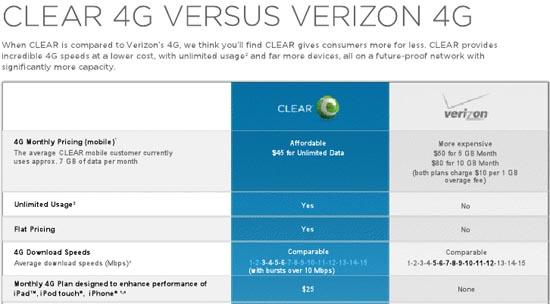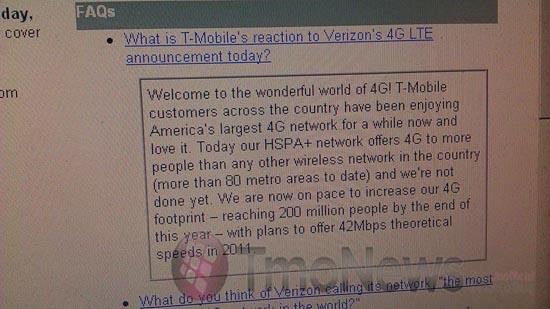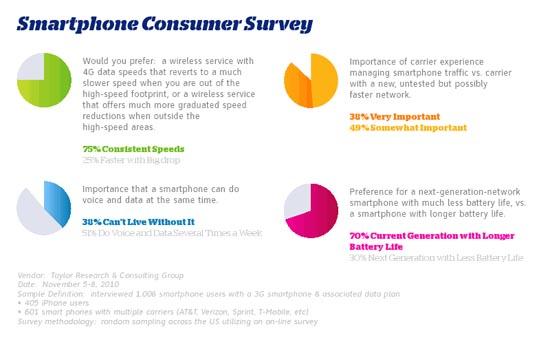
Yesterday Verizon announced the details of its upcoming LTE launch and, just like with T-Mobile's branding of their 4G network branding, their competitors have chimed in on the matter. First up we have Clearwire, who provides the WiMAX service used by Sprint. Mike Sievert, Clearwire's Chief Commercial Officer, puts in his two cents on the "What is 4G?" debate, explaining that "4G" simply means "next generation," which also means "Speed, Capacity, and Value." Unsurprisingly, Sievert claims that Clearwire offers the best combination of all three. While the speeds offered by WiMAX are comparable to, if not a bit slower than, Verizon's LTE, Sievert believes that what everyone should focus on is capacity. Since Clearwire has such a large amount of spectrum, they're able to offer "unlimited usage at a good price" compared to VZW. The company has put together a chart to illustrate their claims, which you can see a portion of below. The entire thing can be read right here.
Just like in their marketing, T-Mobile is using the size of their 4G network in the battle against Verizon's new LTE market. While Big Red will cover 38 markets and 60 airports with 4G this weekend, T-Mobile has 4G coverage in 80 markets across the country, with plans to reach 200 million people by the end of the year. Additionally, T-Mo says that they plan to upgrade their network to offer theoretical speeds of 42 Mbps next year. The number of 4G-capable devices also plays a part in T-Mobile's rebuttal, as the carrier explains that they have a "strong lineup" of 4G devices for this holiday season, like the G2 and the myTouch 4G.
Finally, we have AT&T, who will be the only national carrier without a 4G network after this Sunday. AT&T, while agreeing that speed is a big part of the 4G experience, believes that consistency is just as important. Rather than making the jump to LTE right now, ATT believes that it's important to have a solid, speedy HSPA+ foundation for consumers to fall back on when they leave an area with LTE. It'll take a long time for LTE to have broad coverage, they say, so carriers should invest in their current 3G networks, too. In a colorfully illustrated survey, AT&T shows that 75 percent of their customers would rather have a network that offers smaller drops in speed when you leave a high-speed coverage area as opposed to a 4G network with more significant speed drops outside of the 4G area. You can check out the charts below.
Each of Verizon's competitors is taking a different approach in explaining why their buildout plans are the way to go, and each has their pros and cons. Clearwire does have a point in their argument that offer a decent value for your money, especially when you consider a recent report showing that a user could burn through their 5GB allotment with Verizon LTE in just 32 minutes at max speeds. If you're a speed freak, though, Verizon's LTE network seems to be offering speeds faster than Clearwire's network can provide right now. That's likely to change as more users hop on VZW's network, though, and speeds will always vary depending on where you live.
T-Mobile does currently have the largest 4G network (although AT&T claims that it will have a larger HSPA+ network at the end of 2010), and their prices are generally lower than their competitors. Then again, T-Mo has been building out their HSPA+ network for some time now and, while they may cover 200 million people by the of the year, VZW says it will have 110 million people with access to LTE by the same time. Once Verizon really gets going with its 4G buildout, it'll be interesting to see who can cover more people quicker between the two.
AT&T is sticking with 3G for now, forgoing LTE until the middle of next year, and they're ok with that. I'm glad that they're going to continue to build out and enhance their 3G network, but I can't help but think that they're shooting themselves in the foot a bit. Yeah, I'm sure that a lot of people would prefer a more gradual speed drop when they leave a high-speed area; I'm also sure that a lot of those same people rarely leave the town/city that they live in. I don't know about you, but I'd be willing to drop to slower HSPA, or maybe even EDGE, for a bit outside of my town if it meant I could get consistent 4G speeds during the 90 percent of the time that I'm in town.
Now that we've covered all of the competitors' reactions to Verizon's LTE launch, what do you think about it? Which company do you think presents the strongest argument for their approach to 4G?

